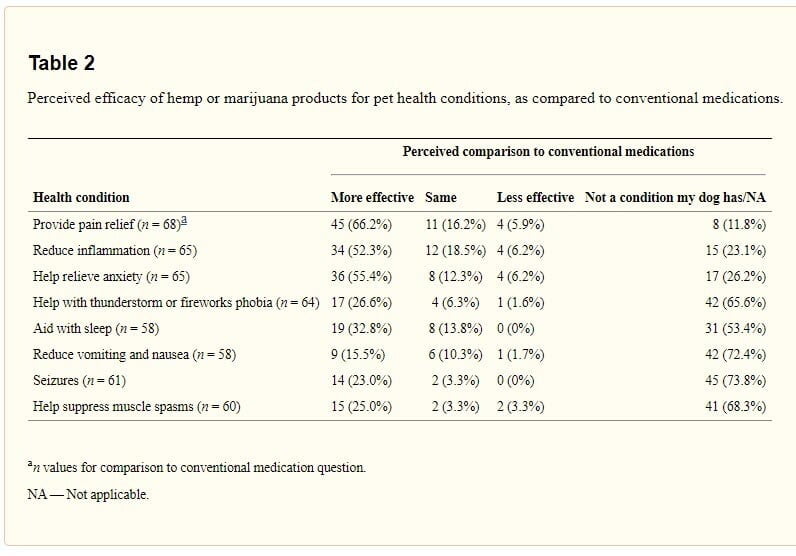Veterinarians and Clients Perspective on The Utilization and Efficacy of Hemp Products
In the year of 2018, the hemp farm bill was passed that removed hemp from being considered a Schedule 1 drug according to the controlled substance act.1 Hemp can now legally be grown as a plant, prepared, and sold across the United States.1 To be classified as hemp instead of marijuana, the full weight of the plant must contain less than 0.3% of tetrahydrocannabinol (THC). 7 The Food and Drug Administration discourages the utilization of hemp products for medicinal purposes for pets due to the lack of regulations within the industry. 7 In a study comprised of 2,130 veterinarians 61.5% of them felt that they could confer with their colleagues regarding the utilization of cannabidiol (CBD) products but only 45.5% of them felt that they could approach clients on the utilization of CBD products.1 When the veterinarians were asked if they had any clinical experience with CBD products in dogs, 56.1% said that they had.1The majority of the participants identified that both marijuana and CBD products do contain benefits to the human body and were in favor of utilizing CBD products for animals.1
The majority of cannabis research that has been completed, has been focused on the toxicity of cannabis and has not included the medical benefits of cannabis, CBD, or hemp.5 A large misconception exists between the pharmacodynamic of THC and CBD and that marijuana is the same as hemp and every product will have the same effect on the body.5 Veterinarians are not comfortable discussing hemp or are allowed to prescribe hemp in the United States but the general public has access to a myriad of consumer products at their disposal. 5 The products that are available have minimal quality control protocols and labeling requirements to follow.6 However, consumer consumption of hemp products continues to increase without veterinary support or guidance.4 Table one displays veterinarian’s opinions of utilizing medicinal hemp/CBD from a medical and moral standpoint. 1

In demographic areas where the recreational utilization of marijuana has been legalized, there was an increase in veterinarians and clients willing to discuss CBD products than in states where recreational use of marijuana is considered illegal.1 The most common ailments that veterinarians felt that CBD had the potential to have an effect on were decreased amount and severity of seizures, anxiety relief, and pain management for acute or chronic pain.1 Nonsteroidal anti-inflammatory drugs (NSAIDS) are used to treat chronic pain such as osteoarthritis but have the potential for many side effects that may affect the kidney and liver in dogs. 2 This can be especially concerning to geriatric patients and owners who are looking for alternative solutions.2 Alternative therapies such as CBD has gained interest due to decreased side effects seen in animals compared to prescribed medication. 2 CBD substances that are most commonly given to domesticated animals include oils, extracts, and edibles. 1 In a study of 70 dog owners who have used hemp on their animals, 92.9% of them said they would recommend these products to friends to use on their own dog. 4 Table two demonstrates a myriad of health conditions that were treated with hemp or marijuana products as treatment for their dog compared to conventional medication and which the owner felt was most effective. 4

The veterinarians impression from the state veterinary associations and veterinary boards in the United States on the guidelines for working with hemp is not clear and veterinarians are unsure of how to proceed.1 The mammalian body is naturally filled with cannabinoid receptors in the central and peripheral nervous sytem.2 CBD has been reported from other researchers to pertain immunomodulatory, anti-hyperalgesic, antinociceptive, and anti-inflammatory properties within the body.2 The majority of recent veterinary graduates and states where recreational marijuana is legal do not perceive CBD as a schedule 1 drug and would like for the classification of marijuana to be reviewed.1 There was an increase in requests from recent graduates and those practicing in states with legalized recreational marijuana for the necessity of research focusing on the utilization of CBD in dogs.1
There is a lack of knowledge and scientific research regarding how to dose animals and what type of product to recommend to clients when it comes to hemp or marijuana products for animals. 2,7 Veterinarians do not feel that they have had adequate education or training on CBD and how to properly prescribe CBD to patients. 1, 3 According to the data presented in Table 3, clients are curious on the subject of hemp and how CBD may be able to benefit their pets.1

There seems to be a gap between clients and veterinarians’ interest in discussing hemp for their pets. Natural pet supplement sales have nearly doubled between 2008 and 2014 and has seen a steady increase of 3-5% annually within the United States.1 Globally, the legal cannabis market is projected to hit $31.4 billon within the industry by 2021.4 When pet owners are looking for information on CBD products, most go to product information/ websites instead of their veterinarian.4 There has been an increase in toxic levels and overdosing of cannabis in pets that may be caused by owner’s lack of knowledge in correct dosing for their pet.4 This has been demonstrated by the Pet Poison Hotline reporting a 448% increase in marijuana toxicity cases between 2011 and 2017.4 If owners are asked to compare the overall efficacy of hemp products versus medication or therapy, most felt that hemp products were more efficacious than other treatments in the United States and Canada.4
The American Herbal Products Association (AHPA) has established a team including doctors, veterinarians, scientists, product innovators, and educators to aid in the gap between the safety and utilization of herbal products and consumers knowledge, experience, and opinions when giving hemp products to their pets.3 The AHPA also lists current hemp/ cannabis clinical studies, FDA guidelines, label identification, and requirements, as well as companies that are not following guidelines or are being investigated that consumers should stay away from.3 In a study where 29 animal hemp products were reviewed for their labeling, only 18 were labeled correctly. 6 Out of the 29 products tested, only 22 provided their consumers with a third party certificate of analysis to verify what is in each bottle and how much of each ingredient their product contains.6 If veterinarians were supplied with a certificate of analysis including calculations of cannabinoid concentrations, THC percentages, and full spectrum vs. isolate products; they would be better informed on how to dose their patients.6 This has the potential to decrease the amount of marijuana toxicity cases seen by veterinarians.
Supplement labeling is controlled by the Dietary, Supplement, Health, and Education Act (DSHEA).6 DSHEA does not cover labeling for any animal products.6 Animal supplements are self-regulated with minimal oversight from the FDA.6 Labeling for any product can be confusing and overwhelming and the AHPA gives tips on what to look for such as full spectrum products and what to avoid when consumers are shopping for hemp products for their animals.3 There is a significant difference between full spectrum hemp products and isolate hemp products that requires education on all of the diverse chemicals that make up the hemp plant and the benefits of each compound that consumers may be unaware of.3
The AHPA can also be a tool that veterinarians can utilize to educate themselves on the revolving change seen in laws and regulations on cannabis products. Veterinarians are not the first source that clients look to when researching cannabis products but that has the potential to change.4 With all of the constant changes, it makes it difficult for veterinarians to stay up to date on the changing laws, yet it is important that veterinarians are an unbiased resource for clients instead of product websites when giving supplements to their pet.1,4 Veterinarians need to advocate and push harder for the necessary scientific research to give them guidelines on how to approach the use of hemp in animals including efficacy, dosing, and types of treatment so veterinarians can become the number one source for consumers regarding hemp or marijuana product consumption in animals.
Key Words: Hemp, CBD, Pet Owners, Veterinarians, Labeling, American Herbal Products Association, Advocacy, Hemp Product, Consumers, FDA, DSHEA
Sources (AMA Format) :
- Kogan L, Schoenfeld-Tacher R, Hellyer P, Rishniw M. US Veterinarians’ Knowledge, Experience, and Perception Regarding the Use of Cannabidiol for Canine Medical Conditions. Front Vet Sci. 2019;5:338. Published 2019 Jan 10. doi:10.3389/fvets.2018.00338
- Gamble LJ, Boesch JM, Frye CW, et al. Pharmacokinetics, Safety, and Clinical Efficacy of Cannabidiol Treatment in Osteoarthritic Dogs. Front Vet Sci. 2018;5:165. Published 2018 Jul 23. doi:10.3389/fvets.2018.00165
- CANNABIS ALERT: Cannabis, CBD, regulations, and the AHPA (concierge for better living). Constantcontact.com. https://myemail.constantcontact.com/CANNABIS-ALERT–Cannabis–CBD–Regulations–and-the-AHPA–Concierge-for-Better-Living-.html?soid=1101334774265&aid=Pyxw6hX8U0c. Accessed August 3, 2020.
- Kogan LR, Hellyer PW, Silcox S, Schoenfeld-Tacher R. Canadian dog owners’ use and perceptions of cannabis products. Can Vet J. 2019;60(7):749-755.
- Vogt NA, Sargeant JM, Stevens CPG, Dunn JN. A survey of veterinary student attitudes concerning whether marijuana could have therapeutic value for animals. PLoS One. 2019;14(7):e0219430. Published 2019 Jul 8. doi:10.1371/journal.pone.0219430
- Wakshlag JJ, Cital S, Eaton SJ, Prussin R, Hudalla C. Cannabinoid, Terpene, and Heavy Metal Analysis of 29 Over-the-Counter Commercial Veterinary Hemp Supplements. Vet Med (Auckl). 2020;11:45-55. Published 2020 Apr 15. doi:10.2147/VMRR.S248712
- Deabold KA, Schwark WS, Wolf L, Wakshlag JJ. Single-Dose Pharmacokinetics and Preliminary Safety Assessment with Use of CBD-Rich Hemp Nutraceutical in Healthy Dogs and Cats. Animals (Basel). 2019;9(10):832. Published 2019 Oct 19. doi:10.3390/ani9100832
Menu
Useful Links
Newsletter
Copyright ©2024 HempMyPet. All Rights Reserved. Made with 💖 by Hire X Studio™.
